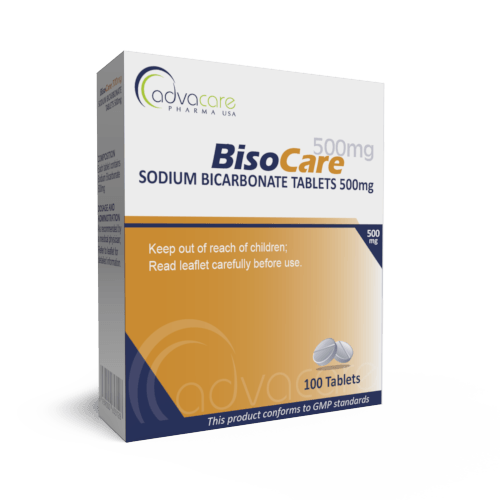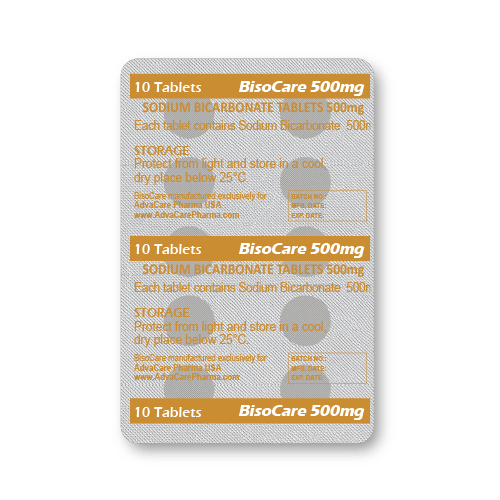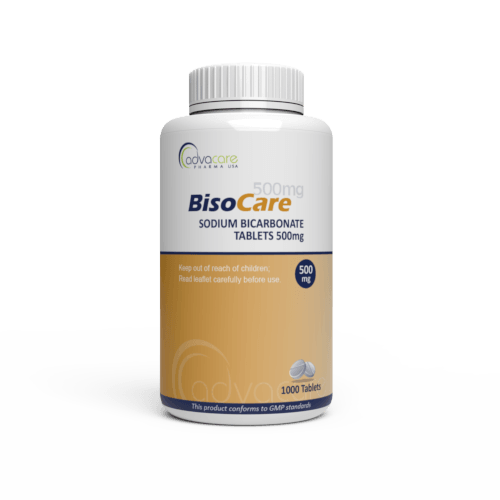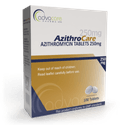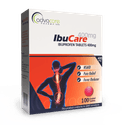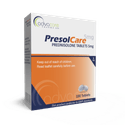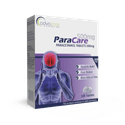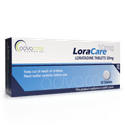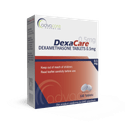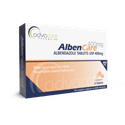- Home›
- Pharmaceuticals›
- Pharmaceutical Tablets›
- Sodium Bicarbonate Tablets
Sodium Bicarbonate Tablets
Dosage
Packaging
What is Sodium Bicarbonate?
Active Ingredients: Sodium Bicarbonate
Sodium Bicarbonate Tablets are an antacid used to relieve heartburn, upset stomach, and acid indigestion. It quickly works to temporarily treat symptoms caused by too much stomach acid. Sodium bicarbonate is also used to treat metabolic acidosis caused by severe renal disease or other problems.
Sodium bicarbonate may also be known by its common names of sodium bicarb or baking soda.
Sodium bicarbonate is an alkalinizing agent. It works by increasing plasma bicarbonate, buffering excess hydrogen ion concentration, raising blood pH, and reversing the clinical manifestations of acidosis.
Sodium Bicarbonate Tablets are produced with a dose of 500mg. They are available for distribution as boxes of 100 tables or bottles of 1000 tablets.
AdvaCare Pharma also manufactures and distributes Sodium Bicarbonate Injections and Antacid Oral Suspension Standard Formula, a combination antacid containing sodium bicarbonate, magnesium trisilicate and magnesium carbonate.
AdvaCare is a GMP producer and exporter of Sodium Bicarbonate Tablets. This medicine has been manufactured in our factories located in China, India, and the USA. We routinely inspect these facilities to ensure our products meet quality and safety standards.
Why choose us as your Sodium Bicarbonate manufacturer?
AdvaCare Pharma is a trusted Sodium Bicarbonate manufacturer committed to providing quality-assured, cost-effective pharmaceuticals for an ever-changing global market. Manufacturing a wide range of 200+ pharmaceutical products in tablet form, we ensure that all of our oral solid dosage forms adhere to stringent GMP standards.
We operate according to a unique "vested supplier-distributor relationship" business model, in which we tie our success in a market to that of our distributor. Such a model facilitates a closer relationship by working together to achieve pre-defined goals for market entry and expansion. As a Sodium Bicarbonate manufacturer and global supplier, we implement unique strategies to ensure successful distribution.
Uses
What is Sodium Bicarbonate used for?
It is used as a short-term treatment for heartburn, upset stomach, and acid indigestion. Sodium Bicarbonate is also used in the treatment of metabolic acidosis associated with various disorders.
How should Sodium Bicarbonate Tablets be used?
This medication is intended to be taken orally. Sodium Bicarbonate Tablets should be taken with a glass of water. They should be taken on an empty stomach, or 1-3 hours after eating a meal when using it as an antacid. Do not take Sodium Bicarbonate Tablets within 1-2 hours of taking other medications.
Can Sodium Bicarbonate Tablets be used with other antacids?
It is not advised to use Sodium Bicarbonate Tablets with other antacids unless under the guidance of a doctor.
How should Sodium Bicarbonate Tablets be stored?
It is recommended to store these tablets in their original packaging until use. The medicine should be kept in a cool, dry place. Check the expiration date on the packaging before use and discard any outdated medicines. The tablets should be kept out of the reach of children.
What dose should be taken?
Adult Dosing For dyspepsia in adults younger than 60 years old, the usual dose is 1000-5000mg taken every 4-6 hours, as needed. Alternatively, 325-2600mg is taken every 4 hours. The maximum dosage is 15.6g per day.
For dyspepsia in adults older than 60 years old, the usual dose is 650-1300mg taken every 4 hours, as needed. The maximum dosage is 7800mg per day.
For chronic metabolic acidosis, the usual dose is 3000-5000mg per day, but the exact dose is individualized based on the patient’s acid-base balance and electrolyte status:
- chronic renal failure: 1625-2925mg per day, divided and taken every 4-6 hours
- distal renal tubular acidosis: 42-168mg/kg per day, divided and taken every 4-6 hours
- proximal renal tubular acidosis: 420-840mg/kg per day, divided and taken 4-6 hours
For moderate metabolic acidosis, the usual dose is 325-2000mg taken 1-4 times per day.
For urinary alkalinization, the usual dose is 975-2000mg, divided and taken every 4 hours. The starting dose is 3900mg taken once. The dose should be adjusted based on urinary pH. The maximum dosage is 15.6g per day and 7.8g for patients who are older than 60.
Renal Dosing Guidelines for dosing adjustments have not been defined for patients with renal impairment. It is advised to exercise caution, as this drug may cause sodium retention.
Hepatic Dosing Guidelines for dosing adjustments have not been defined for patients with hepatic impairment.
Pediatric Dosing For urinary alkalinization in children over 12 years old, the usual dose is 325-2000mg, taken 1-4 times per day.
For hyperuricemia secondary to chemotherapy in children from 0 to 12 years old, the usual dose is 12g/m2 per day, divided and given in 4 doses. The dose should be titrated to maintain urine pH between 6-7.
The dosage is based on medical condition, response to treatment, age, and weight. Refer to a doctor or pharmacist for guidelines on dosage. Do not exceed what they advise.
What happens if a dose is missed?
When used as needed, the tablets are unlikely to be missed. When a scheduled dose is forgotten, it should be taken as soon as it is remembered. If it is nearly time for the next scheduled dose, then the missed dose should be skipped. Do not take 2 doses at the same time.
Who can use Sodium Bicarbonate Tablets?
Sodium Bicarbonate Tablets can be given to adults and children over 12 years old, but caution is advised for specific groups of patients.
Pregnant Sodium Bicarbonate should be used cautiously during pregnancy and the benefits must be weighed against the risks before using this medication. It is important to note that excessive sodium may cause fluid buildup. There is insufficient human data available to assess the risk of fetal harm. Adequate animal studies have not been conducted to assess the effects on pregnancy.
Breastfeeding The benefits must be weighed against the risks of use in breastfeeding women. It is not known if this drug is passed into breast milk. Human data is not available to evaluate the risks of infant harm or the effects on milk production.
Children Guidelines for safety and efficacy have not been established. Sodium Bicarbonate is not recommended for long-term treatment of acid reflux in pediatric patients.
Geriatric It is advised to use a lower dose, as some elderly patients may be more sensitive to Sodium Bicarbonate. Patients over the age of 60 should take these tablets for 5 days unless under the guidance of a doctor.
Other warnings
Sodium Bicarbonate may mask symptoms of stomach disease.
It is advised to monitor acid-base balance, serum electrolytes, serum osmolarity, and serum sodium bicarbonate during therapy.
The prolonged use of Sodium Bicarbonate Tablets may lead to fluid or electrolyte imbalances or hypokalemia.
The combination of Sodium Bicarbonate and K-depleting drugs such as bumetanide or furosemide may cause hypochloremic alkalosis.
Side Effects
As with all pharmaceuticals, some unwanted effects can occur from the use of Sodium Bicarbonate Tablets.
Common side effects include, but may not be limited to:
- dry mouth
- urinating more frequently
- gas
- abdominal cramps
Seek emergency medical care in the event of an allergic reaction.
Stop using this medicine and contact a healthcare professional if the following symptoms develop:
- swelling or rapid weight gain
- shortness of breath with mild exertion
- severe stomach pain
- loss of appetite
- mood or mental change
- muscle pain
- muscle twitches
- nausea
- vomiting
- nervousness
- slow breathing
- unpleasant taste
- unusual tiredness or weakness
- blood in the urine or stools
For a comprehensive understanding of all potential side effects, consult a medical professional.
If any symptoms persist or worsen, or you notice any other symptoms, please call your doctor immediately.
Precautions
Do NOT use Sodium Bicarbonate Tablets if:
- You are allergic to any of the ingredients.
- You have pulmonary edema.
- You have alkalosis.
- You have hypernatremia (high levels of sodium in the blood).
- You have hypocalcaemia or hypochlorhydria.
- You are having difficulty passing urine or are passing more urine than usual.
Before treatment, consult your doctor regarding any medications you are taking to address potential drug interactions.Sodium Bicarbonate Tablets are known to interact with certain antifungals (itraconazole, ketoconazole), some antibiotics (amikacin, gentamicin, tetracycline, rifampicin), blood thinners (aspirin, dipyridamole), glucocorticoids, lithium, methotrexate, phenytoin, penicillamine, quinidine, ephedrine, and some types of medicines for hypertension or cardiac disease. This is not a complete list of possible interactions.
This medication may not be suitable for people with certain conditions, so it is important to consult with a doctor if you have any health conditions. Special considerations or additional monitoring may be necessary for conditions such as:
- liver disease
- kidney disease
- heart disease
- current stomach ulcer
- eclampsia
- low sodium diet
- swelling (edema)
- recent appendicitis
- respiratory depression
- high blood pressure
- iron deficiency
- hyperaldosteronism
- elderly
- children
- pregnant or breastfeeding
Sodium Bicarbonate Tablets are not expected to cause side effects that would impact the ability to drive or operate machinery.
This medicine contains salt (sodium). It is advised to consult a healthcare professional if you are on a low-sodium diet.
Do not consume large amounts of milk or dairy products while taking Sodium Bicarbonate Tablets. This may increase the risk of side effects.
It is recommended to avoid drinking alcohol while taking Sodium Bicarbonate Tablets.
Sodium Bicarbonate Tablets should not be taken for longer than 2 weeks. If symptoms persist past 2 weeks, it is advised to consult a doctor.
References
Effects of Enteric-Coated Formulation of Sodium Bicarbonate on Bicarbonate Absorption and Gastrointestinal Discomfort
This study aimed to assess the impact of enteric delivery of sodium bicarbonate on bicarbonate absorption and related side effects in a human experimental trial targeting enhanced exercise performance. Pharmacokinetic analysis and gastrointestinal symptom assessments were conducted after the oral administration in human subjects.
The study determined the dosage required to elevate blood bicarbonate concentration by over 5 mmol/L⁻¹ to enhance performance during high-intensity exercise. Enteric-coated tablets safeguarded sodium bicarbonate under acidic conditions and released bicarbonate in the intestines. The enteric-coated formulation reduced the necessary oral dose to achieve a blood bicarbonate concentration over 5 mmol/L⁻¹ from 300mg/kg⁻¹ with uncoated tablets to 225mg/kg⁻¹.
Results showed that participants receiving 225mg/kg⁻¹ of enteric-coated tablets experienced significantly decreased gastrointestinal discomfort compared to those given 300mg/kg⁻¹ of uncoated tablets.
These findings indicate that enteric-coated tablet formulation could reduce the required oral dose by 25% to achieve a blood bicarbonate concentration over 5mmol/L⁻¹, from 300mg/kg⁻¹ to 225mg/kg⁻¹. These tablets can also reduce gastrointestinal discomfort.
You might be interested in...
Why AdvaCare Pharma?
As an industry leader, we are aware of our responsibility to provide affordable and sustainable solutions to improve healthcare worldwide.
